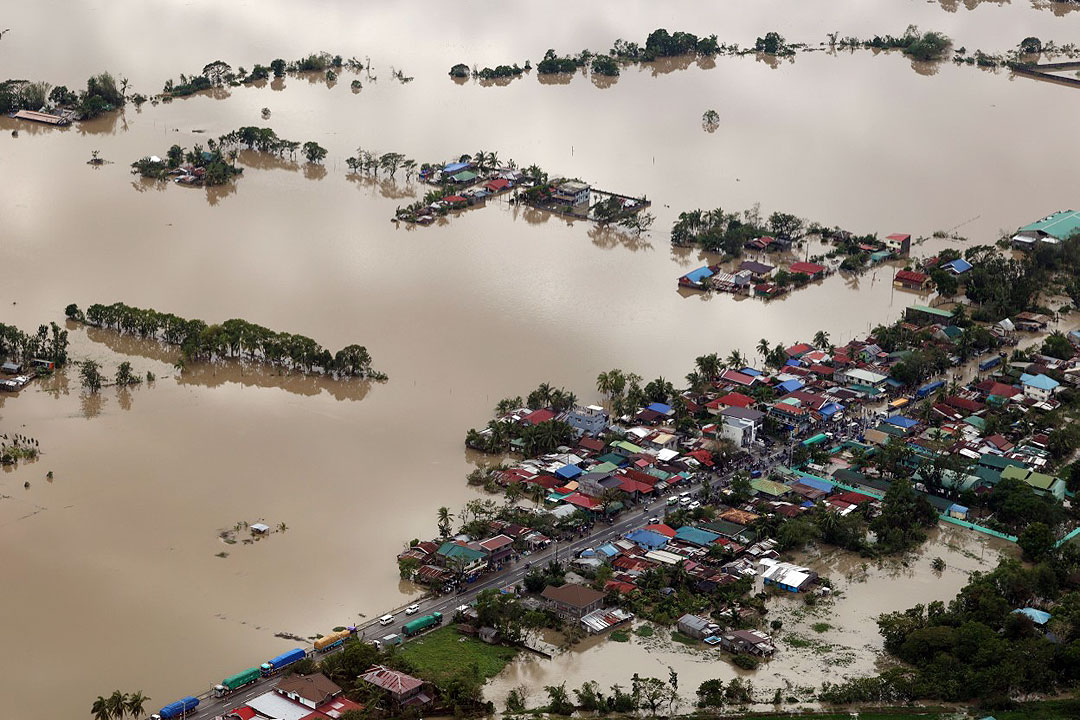
Grassroots & Governance
By Teresa S. Abesamis

In a recent TV interview, NGO leader Lidy Nakpil advocated more pressure from the Philippines for global recognition of the obligation to the country, which is one of the, if not the greatest, victims of climate change. Typhoons, tsunamis, floods, and destructive weather events have made our island nation more and more vulnerable to changes in the world’s deteriorating environment. And most of the victims are among our poorest.
Conference after conference on the subject of climate change have been attended by world leaders; yet in none of these have our own leaders brought our dire situation to the fore. Commitments are made by governments to reduce carbon emissions — which are generally not actually met.
Recently, development banks including the World Bank and the Asian Development Bank have announced loans to our country to deal with climate change issues, including preventive undertakings such as cleaning up our waterways, and developing disaster management. But these are loans to be paid for by our country.
Why should we be made to pay for disasters suffered by our people which the world knows are generally caused by high carbon emissions mostly generated by rich industrialized nations? There are enough studies that indicate that while we certainly could help reduce disasters by reducing our use and careless disposal of plastic and aluminum packaging, our own contribution to the world’s climate change is minimal compared to industrialized nations. We are more the victims rather than the cause.
There has to be a way to render global justice in this matter. Reductions in carbon footprints are not adhered to as promised. Although there has been some progress, there has not been enough to protect our people from disasters over the long run. And it is our poor who will continue to suffer the most.
Obviously, it is not enough to obtain verbal commitments on reducing carbon footprints. Institutional control mechanisms need to be designed and installed globally to ensure climate change justice. The big producers of carbon emissions must be penalized; and the victims must be provided assistance for their sufferings. The recent conference on climate change in Paris featured an attempt to make big carbon emitters pay for their pollution; but this was unsuccessful.
Instead of loans, for example, we should be given grants for dealing with climate disasters such as floods and typhoons. How do we raise money for the grants? The global development community, led for example by the United Nations, through its associated financial institutions such as the World Bank and the IMF, could set up mechanisms for monitoring countries’ contributions to carbon emissions. Global conferences can go beyond verbal commitments, and nations can agree to pay for carbon emissions beyond the maximum globally accepted by scientists as tolerable.
We have to start somewhere. Initially, carbon emissions generated from energy production by countries should be measured. Standards can be set, and penalties agreed on to be paid to institutions assigned to monitor and accept penalties which can then be used to fund grants to victims of climate change.
In addition, grants can be funded for initiatives in reducing pollution, such as innovations in biodegradable packaging materials. Let us recognize that while our contribution to the carbon footprint is minimal by global standards, we do happen to be one of the worst garbage polluters. Our massive tons of plastic and aluminum packaging materials exacerbate our massive floods. We owe it to ourselves to seriously undertake studies on how to reduce these destructive wastes.
I recently discovered packs of facial tissues made from bamboo, made in China. Such paper products have to be readily biodegradable! If we can make facial tissues, we should be able to develop alternative packaging materials out of bamboo. Imagine the impact of such innovations on our flood control and on markets for bamboo products which we can propagate in our country? There is enough know-how in UP Los Baños that needs to be turned into practical how-to’s that can be disseminated and advocated.
It is time for our Department of Science and Technology to work with our state universities and colleges to do serious studies on the use of bamboo as a source for alternative packaging materials. Meanwhile, our Department of Agriculture, in coordination with our agricultural schools, should pursue programs to educate our farmers on the cultivation of bamboo products. The bamboo industry is getting ready to bloom with the huge economy of China in the lead. The present market is already too large for the limited supply of bamboo products.
Meanwhile, Malacañang must seriously make plans on how to mobilize global leaders on obtaining climate justice for victims of climate disasters among developing nations, especially the Philippines. We have the moral authority, given global awareness of disasters such as Typhoon Yolanda which killed thousands and left more homeless. This and our sovereign right to the West Philippine Sea have to be priority foreign policy issues. The victim nations have to get together and assert themselves at these global conferences. Climate justice must be delivered before it is too late.
Teresa S. Abesamis is a former professor at the Asian Institute of Management and fellow of the Development Academy of the Philippines.